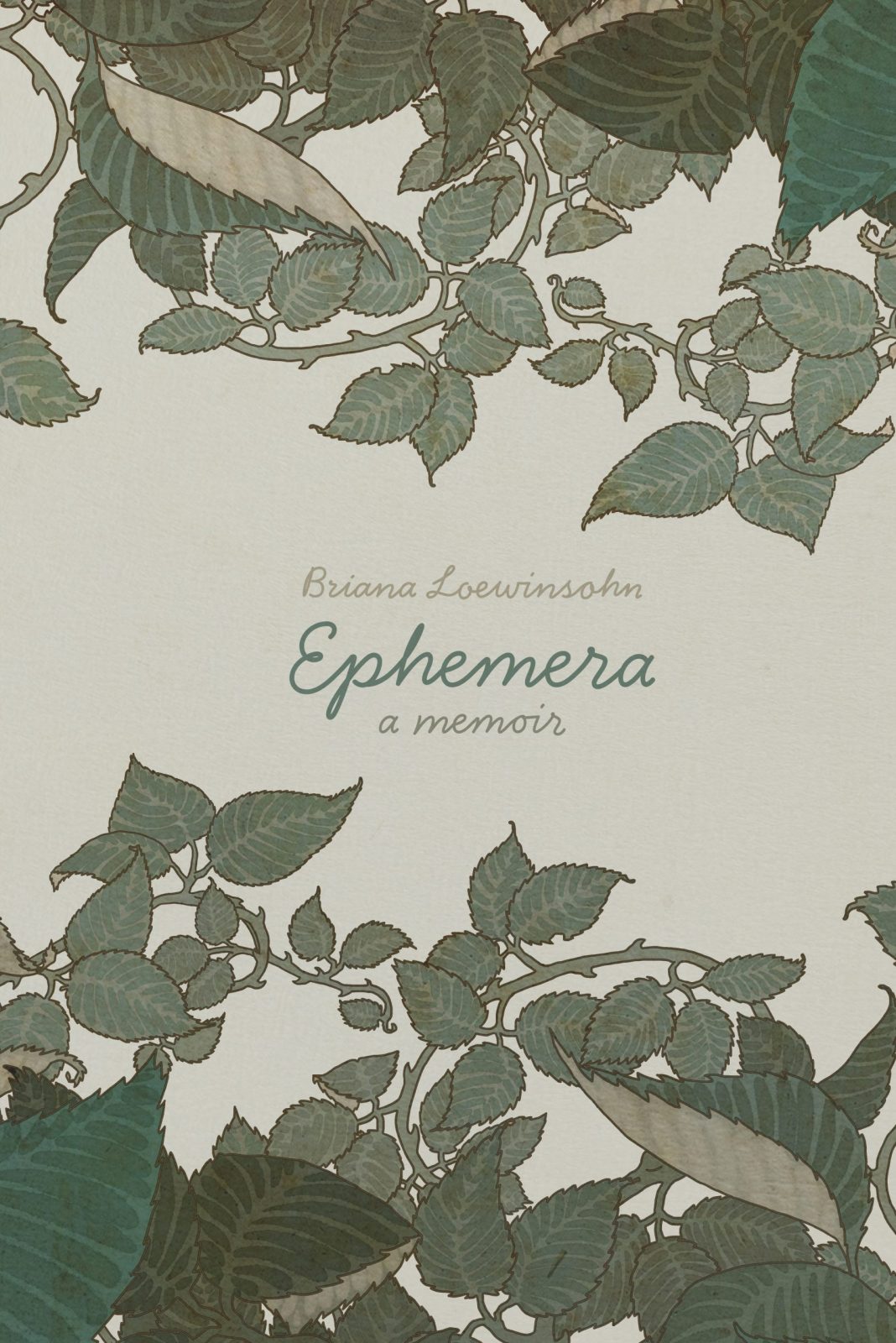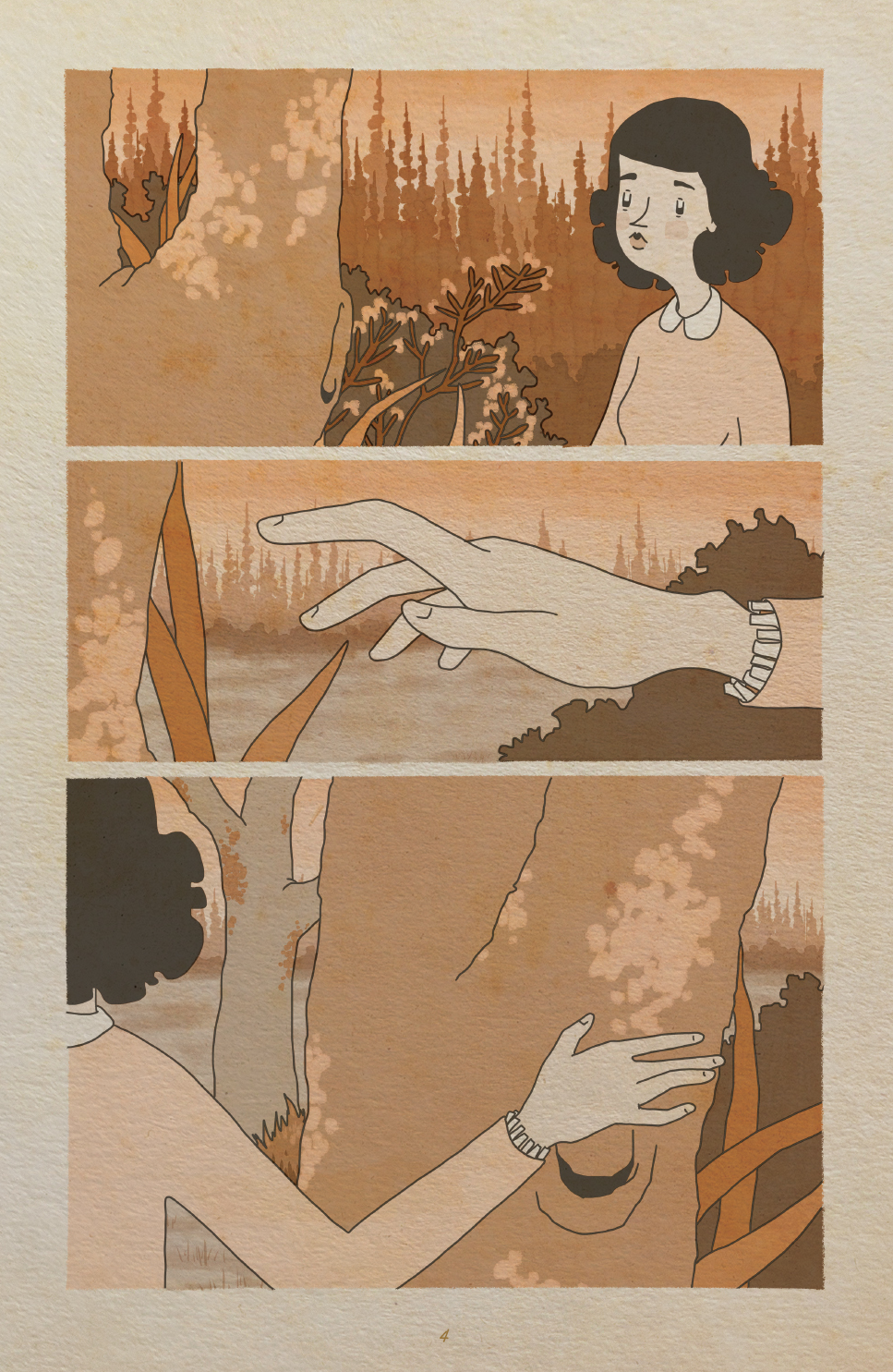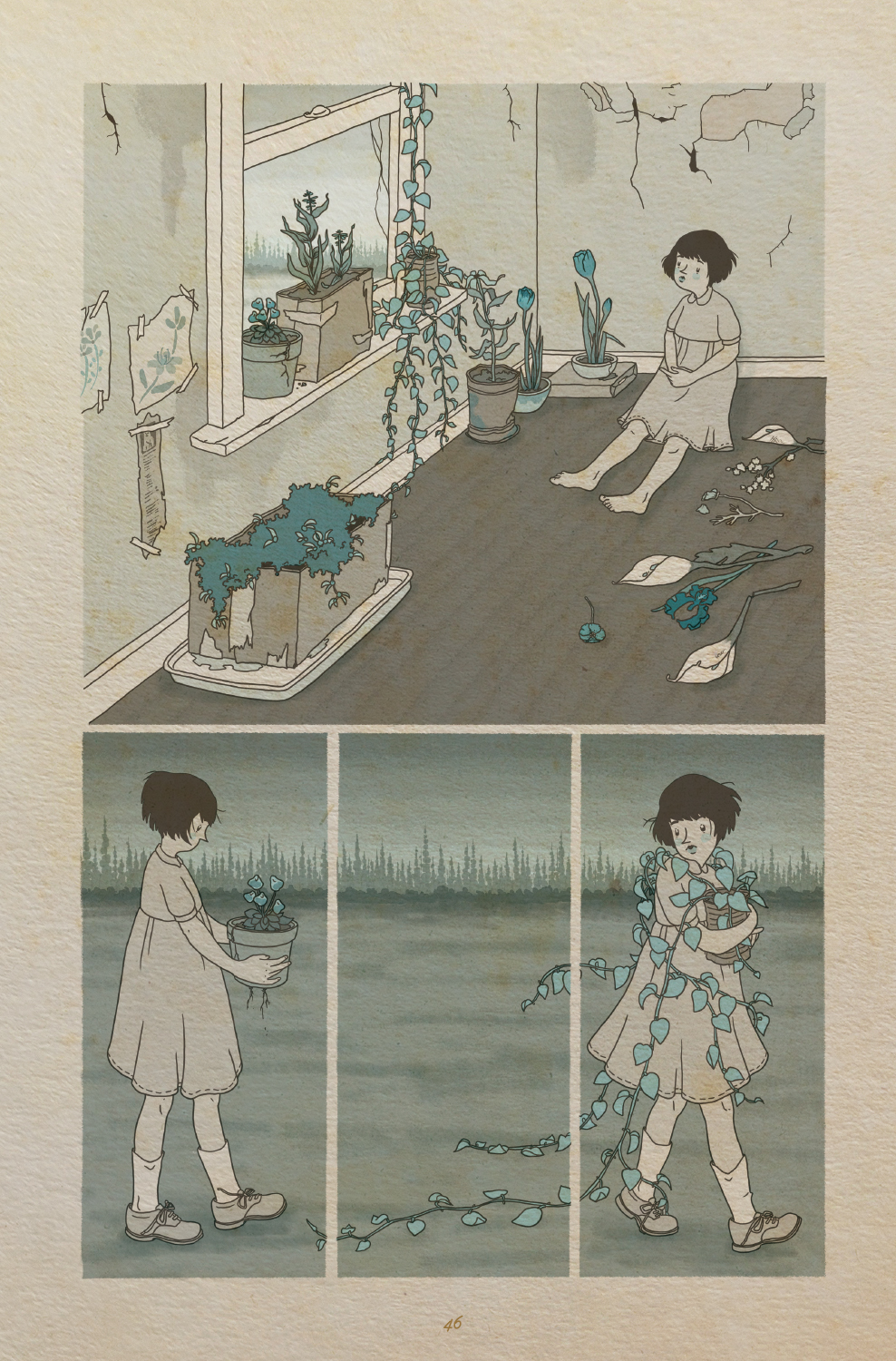Briana Loewinsohn was not a name I was familiar with until I read her graphic novel, Ephemera: A Memoir, which completely and immediately knocked me over; balancing a sparsity of setting with a profound emotional sincerity, Loewinsohn's depiction of her adolescent years, spent with a severely depressed mother, was one of the most visceral depictions of grief that I had encountered in comics. I had the distinct pleasure of speaking with Loewinsohn over email in April, and we discussed her development as an artist and art teacher, as well as the struggles that paved the way. The conversation has been edited for flow and legibility.
-Hagai Palevsky
You mention in your author bio that your parents read comics to you as a kid. Can you share which ones?
My parents were pure hippies, so I grew up with a lot of the underground comix: Yellow Dog, Fabulous Furry Freak Brothers, R. Crumb. I was read every Calvin and Hobbes and Lynda Barry book, like Come Over Come Over and My Perfect Life. My dad loved [Maggie and] Jiggs comics by George McManus. The details from his work have been very influential to me. These are comics that ranged from maybe the 1920s to the 1940s. The art is incredible. When sick as a child my dad would buy me a ginger ale and an Archie comic, telling me this would make the cold go away. Also, how could I forget, MAD magazine. We were hedonists and always folded and creased the back page.
My grandfather was best friends with Charles Addams so we grew up reading those strips over and over. We have a large format cartoon that Addams made for my grandfather upon my grandparents' divorce. My grandfather's last name was Miller (hence the Miller moving truck), and then my grandmother (whose name was not Alice) is supposed to be hidden in the trunk.

That's one hell of a range. Do you revisit those comics on occasion?
I have an 8-year old and a 10-year old, so we have read all the Addams cartoons and are almost done with Calvin and Hobbes. I think we will start Lynda Barry next. I also love her recent work. I look at McManus just for pattern inspiration. Those are probably the ones I look at most often. I will probably wait a bit longer to show my kids the underground comics. Oh, we also read the first couple volumes of The Cartoon History of the Universe by Larry Gonick, which I am currently reading with my kids.
That's wonderful. It's great that you can pass that love on to your kids. Did you have any interest in making comics as a child, or did that come later?
I didn't start having the confidence to do anything cartoonish until high school. In high school I spent a lot of time in cafés drawing with one of my best friends. He and I would draw cartoons of us and our friends doing silly things. He and I still draw together every week via Zoom. We would also write notes a lot and sometimes those consisted of cartoons.
So it was a communal experience, to start with.
Yeah, it definitely started in a communal way. In college was when I started making actual minicomics.
What were those minicomics about? The same sort of slice-of-life/comedy, or did you turn to different directions?
My very first ever couple of minis were about people going through breakups. They told several different stories. Each was done in a sort of surreal way. Then I moved on to more fictional stories. They always tended to be on the sad side and with surreal or dreamy elements. A few followed the same character through his life, but a bunch were just one-off weird little stories. I like to experiment with different drawing styles, so they all look pretty different. All were done with pen and ink. A couple were done with brushes and ink washes.

And did you progress from these college minicomics directly to Ephemera, or was there anything in between?
Well, I had kids. I made my last minicomic after I had my first kid just to prove to myself I could do it, but then I had to give it up. I teach high school art and in the time between my minis and Ephemera I did tons of art, just not comics. I would do things like Hourly Comic Day, which is a yearly event. Then when the pandemic hit I asked my good friend and cartoonist Thien Pham if he wanted to do a daily comic to document quarantine. We laughed and thought it would be a fun two-week project. He also teaches with me at the same high school (also where Gene Yang used to teach). After 100 days of quarantine comics I was losing my mind. It had become such a source of comfort and joy but also anxiety! So, we stopped on day 100. We both then decided that we had time in our day to focus on potentially doing longer form comics. By this point my kids were 5 and 8, so much less work than when they were babies. That is when I started on Ephemera. Thien started on his memoir, which is a story about his family's immigration to America from Vietnam, called Family Style, which comes out June 20th from First Second.
[Laughs] Yeah, I think that's pretty indicative of early COVID habits: "Oh, I'm only going to be doing this for a bit," and before you know it a lot of your previous habits have kind of warped around this new one.
Yeah, I am sure we all had these moments... or longer than moments! The way the pandemic had lasting effects, et cetera.
Tell me about your art teaching. Was that a planned career path, or a more spontaneous decision?
I have taught art at the same high school for 17 years. I love it. I started volunteering in art classrooms when I was in high school and always loved it. I was pretty sure I wanted to teach art for most of my life. I really couldn't imagine a better job. It's great for working on comics also. My students enjoy seeing what I am working on and they inspire me with all the cool stuff they come up with. A lot of time in class they are working on projects, so we all just get to work alongside each other in the art studio. My next book is set in a high school in the '90s, so clearly this world interests me. [Laughs] I also like having a job outside comics. It's nice to use different parts of my brain. Sometimes it can be a lot, but it's worth it.
Has your day job as an art teacher affected the way you approach your own creative work?
Teaching is great for an artist because you have to spend all day getting teenagers inspired to do work. So often kids get discouraged or don't know how to jump into a project. A teacher has to get real creative in how to get them into the piece they are doing.
And I'd imagine you have to be good at articulating your intent and how to convey it, because the kid in front of you doesn't have the privilege of art school and years of experience.
This has helped in my own work because I can tell myself the same things I would tell a student. I also have so many different approaches because students are all so different.
Let's talk about Ephemera. How did that book come about? Was there anything in particular that sent you down that path, that made you decide to make a graphic novel? Did you have any overt "goal" in mind?
Once I was done with those 100 days of silly daily comics I needed a change. I have thought about my mother's death for years and finally felt like I had enough distance that I could write about her. I knew I wanted plants involved, because I love them and I love drawing them. Simple as that. It was giving me panic attacks when I thought about drawing my actual mum, so I set the story in a more hazy immeasurable place and time. Once I made that choice it was easy to let the story just start to work itself out. I write in a very organic way, which works for me. I wanted this book to feel dreamy and a little out of touch. Like our childhood memories. I did not know how it would end or what my overall goal was when I started. Only that I wanted to visually show what it felt like for me as a child and what it feels like as an adult to reflect on that.
At what point did you take it to Fantagraphics?
I had about a third of the book drawn completely. Then I had just a short explanation of the second two-thirds would be.
You achieved the emotional aspect very well, in my opinion. Reading it I couldn't help but think about how strikingly personal the book is, for a debut; it's bolder in its sincerity than some might expect as a first step (or, rather, what may be perceived by mass readership as a first step, since obviously you had your self-published minis), and it avoids the trappings of "relatability" that I think a lot of autobio writers, of any form, often feel pressured into. I'd imagine that, even after that degree of intentional distancing, it wasn't easy, opening up like that.
Thank you so much for all of that. I really appreciate your thoughts, you say it so much better than I could. [Laughs] To be honest, I am a pretty extroverted person. I shared the parts I felt comfortable sharing and things that I felt maybe other people could connect with. I kept things out of the book that I didn't feel safe sharing, or that just would not have fit with the mood of the book. I think the hardest part was sitting with my feelings and trying to convey the exact way something felt. I didn't want to be disingenuous or overdramatic. I also didn't want the book to lean too far in any direction. Too schmaltzy or too dour. It's easy to push something in a direction to fit a better storyline, and was difficult to be honest with myself to whether I was being honest in the book. If that makes sense.
Yeah, that makes a lot of sense. It’s interesting that you talk about extroversion, because what I felt is that the book is, for lack of a better word, rather guarded in what it says outright; for the most part, you avoid particulars, so there aren't a lot of specific events, or key dates, or even any names besides yours, in the book, which I feel is an unusual approach for most autobio comics. I'd imagine it's also something of a dilemma, choosing what to leave in or omit when you are telling a story that is only partially yours.
Huh. I guess what you are saying is pretty true. I suppose I am a guarded extrovert? I like making things that mean a lot to me but also leave a lot up to the reader or viewer to interpret as they want to. Part of the anonymity of things was to give that fog-of-memory feeling I have from childhood, but also part might just be to keep things for myself? I did debate over several parts as to what I would leave in and what I would take out. I guess I wanted a sparsity to the book, so keeping in only certain key moments from my life felt right. I also fused many things into one moment because telling what things felt like was more my intent, rather than just a list of events from my life. It is also helpful that my mum cannot argue with me about how things happened, since she is no longer around.
Yeah, I completely understand that and think it worked out very well. It feels archetypal, almost; there’s a poignancy to it, a very raw humanity, that feels real without reducing itself. You mentioned experimenting with drawing styles earlier, which I want to go back to because, in reading the book, I couldn't think of a single name to compare it to, or any self-evident influences; your voice feels independent in the purest creative way. I'd love to hear about how your approach to the book was formed.
I really do like to draw and paint in a million styles. I guess most of my sketchbooks are filled with awkward freehand drawings of people and plants. I like to draw with, like, a .005 pen to get the most raw type of line. I also love watercolor. I also love old movies and really anything old. I live in an old house, I like used things. I like to feel like I live in someone's grandma's or grandpa's basement, just meaning that I like to surround myself with lots of inspiration. I also love the absurdity of Pee-wee's Playhouse or the Marx Brothers. I guess all of this just leads me to try to make myself draw in a way that feels new and exciting to me.
And, yeah, I know exactly what you mean - to me, one of the great pleasures is just surrounding myself with whatever works I feel compelled by at that moment and just seeing what sticks. In the case of your own work there’s also a clear consciousness of the tactile - I found that a not-insignificant portion of the emotional impact of the book came from the point where craft overlaps with production: the way it's printed on rich, brownish paper that complements your own muted palette, leading to an effect of dulled or repressed emotion. There's a distance to it that I really like.
Thanks. I did want it to look like it was my story, but could have been my mother's or her mother's story as well.
It’s a touch that I think a lot of creators might not have thought about, especially as it pertains to the printing, so I appreciated it. A recurring formal motif in Ephemera is a temporal alienation: your 'character', as an adult and as a kid, visually drifts back and forth between the present day and your recollections, which I find to be not only a lovely formal choice but also a very earnest depiction of depression and grief; the intensity of grief, the experience of it, unmoors you to such a degree that you end up feeling like the lines between the present and the past are nonexistent. The preoccupation with memory, with what is past and what is left, becomes so total that it affects how you experience reality. Is that, if I may ask, a feeling that accompanied you outside of the book as well?
Yes, that is exactly what I am going for in the book. That there are things that make me feel like a child or some version of my younger self. There are things that happened over and over and then I get confused emotionally as to how old I was or am. There are things that happened when I was little that aged me but I didn't know it and then when things happened later it blurred the line in my head.
Yeah, I know what you mean; it’s the sort of intense feeling that tends to warp our internal sensation of time. You close the third part of the book, the final part before the epilogue, on an imagined conversation with your mother, which renders overt an underlying theme of the book, which is an attempt at closure. Do you feel that, through the book, you have achieved that closure in any way?
I feel mixed about that. On the one hand, yes, this book actually did help me be okay with the fact that I simply feel many things about my mum and I think it will always be that way. On the other hand, I have a lot of feelings about her that will never be resolved... which is like the opposite of closure. I am not sure I really believe in closure. To me my relationships with my parents are living breathing things. But coming to the conclusion I did with this book really did help me accept that it might just be like that and that's just how it is.













